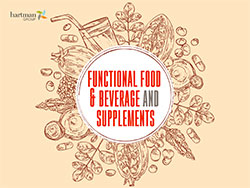
Prior to the novel coronavirus pandemic, Americans were already feeling anxious and stressed. The Hartman Group’s Health + Wellness 2019: From Mindfulness to Moderation report highlighted rising anxiety as a primary health issue facing consumers. Now, halfway through 2020, with the ongoing pandemic fear of contagion adding fuel to the ever-increasing stress of daily life, it is not surprising that the issue of anxiety continues to be prominent. Routine activities such as work, shopping, dining out, and childcare have all been disrupted contributing to a national mood that feels generally fearful and uncertain.
Concerns around immunity and energy are also impacting how consumers gauge their health needs.
In the research behind our Functional Food & Beverage and Supplements 2020 report, many consumers spoke to us about their search for support from supplements and other dietary enhancements. With shopping patterns disrupted and many items in short supply, there was worry about having enough of the right kinds of foods, beverages, and supplements to last for an indefinite period of time.
What does it even mean when something is “functional”?
Cultural Context Affecting Marketing Functionality
Consumers have long been trained to buy fortified foods because of a strong belief in the virtue of getting extra of basic vitamins, minerals, and nutrition. But when talking with consumers, we must remember that “functional” is an industry term and consumers really have their own thoughts and definitions of what functionality means to them.
According to our Functional Food & Beverage and Supplements 2020 report, here’s how consumers understand the term: A food or beverage product containing a positive benefit, inherent or added, that goes beyond basic nutrition.
As consumers engage with a broad array of functional solutions, they employ notions and narratives from today’s health and wellness culture — the result of long-term shifts in consumer understanding of health, the body, and the roles of food and technology.
Cultural influencers, scientific research, and recent health crises highlight interrelated challenges we face regarding food, health, and environment. These ideas make their way into consumer conversations, further articulating the functional benefits landscape and elevating its importance.
Our Functional Food & Beverage and Supplements 2020 report finds that as consumers navigate a diverse marketplace of solutions, the categories of supplements and functional foods/beverages have developed external connections and richer internal distinctions. These map to an array of functional options, from food to supplements and scientific to inherent.

Demand for functional benefits is driving sustained growth and reshaping the food, beverage, and supplements industries.
Our report finds that at least half of adult consumers claim to use functional food (58%) or beverage (56%) solutions to treat or prevent a specific condition, including general prevention efforts. They tend to look to food for help with energy, weight management, digestion, and cardiovascular conditions. Beverages are used, not surprisingly, for hydration — but also for energy, bone and joint health, and immunity.
Three-quarters of adult consumers (75%) claim to be using supplements in service of various health goals. Supplements are often thought of as a general insurance policy — a “just in case one’s diet is not quite adequate” solution.
It is estimated that almost 90% of adult consumers today look for functional benefits in their food, beverages, and, of course, supplements. Supplements are more traditionally and transparently functional, with claims around benefits and potency explicitly linking their ingredients to desired outcomes. The food and beverage space is a bit cloudier, as it encompasses both inherent and enhanced or fortified versions of products. But even the lines between supplements and functional foods/beverages are blurring, as some supplement formats (such as powders and syrups) are added to food and beverages.
About the Report

Functionality is moving far beyond its conventional territory of vitamins and other supplements to play a key role in food and beverage in the U.S., while the supplement market evolves toward contemporary definitions of quality and value. Americans’ engagement with these spaces is measurably intensifying as a result of COVID-19 — a global crisis that will impact how they solve for their health and household needs for years to come. Functional Food & Beverage and Supplements 2020 explores demand-side developments in the functional solutions landscape as well as the disruptive impacts of COVID-19.
